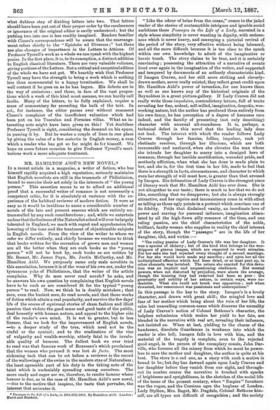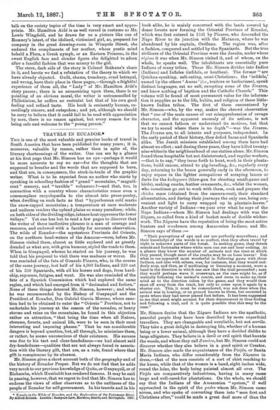MR. HAMILTON AIDE'S NEW NOVEL.*
In a recent article in a magazine, a writer of fiction, who has himself rapidly acquired a high reputation, seriously maintains that English novelists are still in the trammels of Philistinism, bound to exercise their art solely in the interests of "the young person." This assertion seems to us to afford an additional proof that a successful writer of romance is not necessarily a competent critic, for it is absolutely at variance with the ex- perience of the habitual reviewer of modern fiction. It were as easy as it would be invidious to name a considerable number of novels of the late and present seasons which are entirely un- trammelled by any such considerations ; and, while we entertain no fear that the foulness of-the Naturalist school will ever be largely tolerated in England, we mark with regret and apprehension the lowering of the tone and the treatment of objectionable subjects in English novels. From the view of the writer to whom we refer we differ entirely, and chiefly because we venture to think that books written for the recreation of grown men and women are all the better when they are such books as the "young person" will not be hurt by, such books as are written by Mr. Besant, Mr. James Payn, Mr. Justin McCarthy, and Mr. Hamilton Aide. We purposely name only male novelists in this association, because it is of the woes of his own sex, under the tyrannous yoke of Philistinism, that the writer of the article complains. Why do men never read novels? he asks, and he answers his own question by complaining that English novels have to be such as are considered fit for the typical " young person " to read. Now, we think be is doubly mistaken ; that men, even the busiest men, do read novels, and that those works of fiction which attain a real popularity, and survive the few days' life of the scores of equivocal stories of sham fashion and illicit passion that violate the good sense and good taste of the public, deal honestly with human nature, and appeal to the higher side of the reader's own mind. It is not to greater, but to lees license, that we look for the improvement of English novels, —to a deeper study of the true, which need not be the sinful or the cynical ; and to the eradication of the vice of vulgarity and wealth-worship, utterly fatal to the invalu- able quality of humour. The dullest book we ever tried to read was that famous work of Rousseau's which proclaimed that the woman who perused it was lost de facto. The most sickening task that can be set before a reviewer is the record of the wallowings of the swine in the modern stye of Naturalism ; the least agreeable part of his duty is the taking note of the taint which is undeniably spreading among ourselves. The more ready and eager are we, therefore, to render honour where honour is doe, as in the case of Mr. Hamilton Aide's new novel, —due to the motive that inspires, the taste that pervades, the interest that animates it.
• Passages in the Life of a Lady, in 1814-181E-1816. By Hamilton AL16. London : Hunt and Hackett. " Like the odour of brine from the ocean," comes to the jaded reader of the stories of contemptible intrigues and ignoble social ambitions these Passages in the Life of a Lady, narrated in a style whose simplicity is never wanting in dignity, with serious- ness which is never heavy, and conveying a pictorial revival of the period of the story, very effective without being laboured, and all the more difficult because it is too close to the epoch within our own knowledge to admit of the imaginative or heroin touch. The story claims to be true, and it is certainly convincing ; possessing the attraction of a narrative of events lived over again in the imagination of the writer, and supported and tempered by documents of an artlessly characteristic kind. If Imogen Craven, and her still more striking and cleverly- drawn mother, never really existed, they reflect great credit upon Mr. Hamilton Aide's power of invention, for one knows them as well as one knows any of the historical originals of the Reynoldees in a great picture-gallery. If Lady Craven did not really write those impulsive, contradictory letters, full of traits revealing her fine, ardent, self-willed, imaginative, despotic, woe- working nature, but the author has produced them entirely from his own fancy, he has perception of a degree of keenness rare indeed, and the faculty of presenting (not only describing) character with unusual all-roundness. It is, perhaps, a technical defect in this novel that the leading lady does not lead. The interest with which the reader follows Lady Craven through her fancies, follies, impulses, rash yet obstinate resolves, through her illusions, which are both inexcusable and unshared, when she elevates the man whom she intends her daughter to marry into a demigod hero of romance, through her terrible mortification, wounded pride, and motherly affliction, when what she has done is made plain to- her, and she is, for the first time in her life, made to feel that there is a strength in facts, circumstances, and character to which even her strength of will must bow, is greater than that aroused by Imogen. His delineation of Lady Craven is the strongest piece of literary work that Mr. Hamilton Aide has ever done. She is not altogether to our taste ; there is much in her that we do not like, something that we disapprove ; but she is always strongly attractive, and her caprice and inconsistency come in with effect as telling as those ugly points in a portrait which convince one of its fidelity. Pride that disdained vanity, an inordinate love of power and craving for personal influence, imagination stimu- lated by all the high-flown silly romance of the time, and one ruling passion, are the chief characteristics of the noble, brilliant, faulty woman who supplies in reality the chief interest of the story, though the " passages " are in the life of her daughter, idol, and victim :— " The riding passion of Lady Craven's life was her daughter. It was a species of idolatry; but of the kind that belongs to the war- shippers of graven images, which are expected to work miracles. For her sake she had rejected every thought of a second marriage. For her she would have made any sacrifice ; and upon her all the undisciplined affection which had been dried, or at least pent up, in other channels, was lavished. The return she exacted for this devo- tion was an implicit and unquestioning obedience. Her mental powers, when not distorted by prejudice, were above the average, though the training they had received had been so poor : the generosity and nobility of her nature, in certain ways, were un- deniable. What she could not brook was opposition ; and when thwarted, her resentment was passionate and unsorapnlous."
In this passage is the key to the story. Imogen's is a lovely character, and drawn with great skill; the mingled love and fear of her mother which bring about the ruin of her life, the calm but unavailing common-sense which discerns the unreality of Lady Craven's notion of Colonel Bethune's character, the helpless submission which makes her yield to her fate, are blended in the narrative with real art, revealing their influence, not insisted. on. When at last, yielding to the charm of the handsome, dissolute Guardsman (a weakness into which the reader is also led), Imogen falls in love with him, and the material of the tragedy is complete, even to the rejected good angel, in the person of the exemplary cousin, John Dar- vine, who foresees all the misery from which be must be power- less to save the mother and daughter, the author is quite at his best. The story is a sad one, as a story with such a motive is bound to be ; but day has dawned again upon Lady Craven and her daughter before they vanish from our eight, and through- out its sombre course the narrative is touched with sparks of brightness and sprightliness, in the sketches of the social• life of the teens of the present century, when " Empire " furniture was the vogue, and the Corsican ogre the bugbear of London. Lady Stylton, Mrs. Bagot, Mr. Dngdale, Colonel Bethune him- self, are all types not difficult of recognition ; and the society talk on the society topics of the time is very smart and appro- priate. Mr. Hamilton Aide is as well versed in costume as Mr. Lewis Wingfield, and he draws for us a picture like one of Romney's latest, of the idolised, victimised girl, as, prepared for company in the great drawing-room in Wimpole Street, she endured the compliments of her mother, whose poetic mind beheld a Flora, a Greek nymph, or an Eastern Princess, in the sweet English face and slender figure she delighted to adorn after a fanciful fashion that was misery to the girl.
The stern, dark side of the story is Colonel Bethune's share in it, and herein we find a refutation of the theory to which we have already objected. Guilt, shame, treachery, cruel betrayal, and wrong, have their place in these pages,—through a frightful experience of them all, the "Lady" of Mr. Hamilton Aide's story passes ; there is no sermonising upon them, there is no pointing of an obvious moral, the writer is untrammelled by Philistinism, he suffers no restraint but that of his own good feeling and refined taste. His book is eminently human, ex- ceedingly sincere, and outspoken ; and yet, although we should be sorry to believe that it could fail to be read with appreciation by men, there is no reason against, but every reason for its being safe and welcome to the " young person."



































 Previous page
Previous page